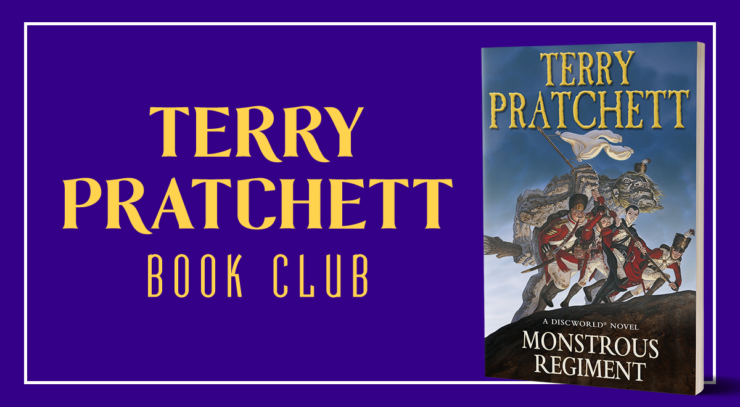To keep your chopped-off hair, or not to keep it? That is certainly… a question.
Summary
Polly informs Blouse of the enemy they’ve captured and Jackrum insists that he be instated as sergeant since Corporal Strappi seems to have disappeared. Blouse talks to the Zlobenian rupert, who tries to frighten him into releasing them and insist backup is coming. What does come is Otto and William from the Ankh-Morpork Times, who are all too eager to write down this story and put it in the paper (with a picture). The squad learns about this newspaper thing and most of them admit to being women, excepting Maladict, who sidesteps the question, and Igor, who’s not there. (Carborundum is actually Jade.) Jackrum comes over and names Maladict corporal in Strappi’s absence, and the troop sets off. Vimes intercepts William’s info for the paper and looks at the picture Otto took; the rupert who called himself Captain Horentz is actually Prince Heinrich of Zlobenia, and he’s been left tied up at an inn in Borogravia. He tells Angua to head to Plotz and keep an eye on what’s happening, then sends the Times’ pigeon along knowing that folks will recognize the prince in the picture and all hell’s about to break loose at that… The troop smells smoke up ahead and Polly and Maladict go to investigate.
Buy the Book


The Saint of Bright Doors
The smoke is from a local man and wife who create charcoal from the surrounding woods, but they’ve been murdered by deserters of the Borogravian army. They also find that a lot of their personal affects have been tampered with or stolen. Polly realizes that Strappi did it—and he’s got her chopped off hair. Blouse asks Polly to shave him since he’s injured himself, but Jackrum steps in and sends Polly off because she can’t do any shaving. Jackrum trains the troop all night as they go about their duties in shifts. In the morning, Polly goes to tend Blouse and finds out that he’s so short-sighted, he somehow missed that his beloved family steed is a mare rather than a stallion. The horse bites Polly on what should be the nethers, and she pretends to be in terrible pain, causing Blouse to faint. When he comes to, she tells him that her trousers are too big, and that she’s fine. The hut of the charcoal-burners—like the barn before it—is mysteriously burnt to the ground. Polly manages to get a chat with Igor… who turns out to be Igorina, as she suspected. She tells her about her stolen hair, and Igorina wonders why Polly kept it with her. The troop arrives at Kneck Valley, and discovers the enemy has light clacks.
The group make to subdue the enemy, but Blouse forces Jackrum to hold for a bit, which makes him furious. Blouse later explains that he wanted to let them continue sending their clacks message so that they wouldn’t be cut off mid-stream, thereby giving the attack away. They bury the bodies and Polly learns that Wazzer (real name Alice) believes that the Duchess is guiding her to do this even though it’s an Abomination, and that she will be given command of the army for it. Blouse and Jackrum are arguing about how to treat a prisoner, and Blouse sends Jackrum away. Polly suggests having a couple of men aid them, and Blouse treats the prisoner, Sergeant Towering, very cordially. Towering informs them that they’re being called the Monstrous Regiment and hunted for what they did to Horentz—the prince. He then escapes, just as Polly tried to warn Blouse he meant to, but Jackrum quickly kills the man. Polly knows he engineered the situation that way because Blouse wasn’t going to allow him to do it. They find a new place to camp, and Polly learns that Lofty and Tonker used to be at the “women’s work school” in her town (and they think Wazzer was there too), an awful place.
Polly has a talk with Jackrum next and calls him out on setting up Towering’s death, as well as scaring off Strappi. Maladict is having a terrible time because his coffee was taken and that’s his displacement addiction. She heads back to Blouse and is about to have to attempt to shave him again when there’s movement nearby. It’s soldiers taking the Ankh-Morpork Times cart through the valley, but they see something where the troop is hiding and send two soldiers on horseback to check it out. Polly and Maladict (who are scouting) stay hidden, and come up on William de Worde, who is desperate to interview them for the paper. He also wants to tell them things they need to know, so Polly convinces Blouse and Jackrum to talk to him. Jackrum lies to de Worde on the way up, saying, Blouse is one of their greatest military minds. William meets Blouse and interviews him, telling him that they’re losing the war, but that they might have a shot… They’ve become a “human interest” story in the paper an Ankh-Morpork is starting to believe they should be on Borogravia’s side as the little guy in the fight. He gets some quotes and has Otto take photos of Blouse. Otto tells Polly that if Maladict doesn’t get coffee, he will revert to his vampiric state and might cause everyone to hallucinate along with him.
Commentary
There’s so much in the book that seems to be commentary on various characters’ mental states that are truly excellent commentaries on gendered bullshit:
She’d gone from boy to girl just by thinking it, and it had been so… easy.
That’s Polly, and she starts using the metaphor of her “socks doing the thinking” after this happens. But like, hey, look, gender is your brain, not your body! You just think it and it becomes real! Which plays into Pratchett’s whole thing about the mind creating reality, but is so important here because… it’s easy. Is it relevant that it perhaps seems easier from a women’s vantage point because you’re trying to assume more power rather than less, and because the male perspective is defaulted to in most cultures, making knowledge of it more ubiquitous? Probably! But it’s still easy to shift your mindset if you have any amount of freaking empathy. Just by thinking it.
Then there’s this one:
As far as Polly could tell, Igors believed that body was nothing more than a more complicated kind of clothing.
Lots of queers and gender non-conforming folk love this specific line of thought, myself included. RuPaul has a famous adage to that effect (born naked, everything else is just drag), but she certainly wasn’t the first to think or say so. What is a body to gender? Eh, it’s sort of like clothes, only you get stuck with one set, so you’ve got to dress it up sometimes to suit the occasion. Like putting your hair in a jar (where it’s still growing).
This is important because we often focus so much on the visual when it comes to gender, and this book is minding that in very specific and accurate ways. In the first section, Polly is told that she needs to stick a sock down her trousers because that’s a big tip-off. People may not think much of men who still seem boyish, but the “missing” bits will get you noticed. For trans women and femmes, it tends to run in the opposite direction, the presence of what people aren’t expecting. All of these soldiers are trying their hand at what we call “passing,” and there are tricks to getting it right.
But at the end of the day, gender is totally unimportant to what needs doing: Polly and Maladict are both good at the job because their mindset is right, not their genders. The book is very breezily showing us how irrelevant gender is, but how forcefully it shapes everything in our lives.
And also how attached we are to it, even when we don’t mean to be. Polly doesn’t truly understand why she kept her hair so that it became a prize Strappi could steal and bludgeon her with. She thought at the start of the book that she never really believed the nonsense about it being her “crown.” But some part of her did care about that hair, enough to want to hold onto it and keep it with her.
The metaphorical weight of that can’t be lost on us. Polly is angry at all the rules leveraged against her for being a woman… but she’s still attached to being one regardless. (This further plays against the common, erroneous refrain that trans men are merely women who hate being women. Because it is entirely possible to hate the restrictions your gender places on you without hating your gender itself, is the point. Not really a hard separation to make at the end of the day.)
As a side note, I really love the dynamic Vimes and Angua have developed at this point. She’s more tuned into him than Carrot ultimately is, and it’s fun to watch that rapport build, particularly when he’s being sneaky and she’s just enjoying the show.
Asides and little thoughts:
- Okay, I’m trying to remember if I’ve read this book before (initially I thought I hadn’t? Pretty sure I missed this one…) because I mentioned Buggy and Hamish being pals and then it happened and I truly cannot figure out if I remembered it, or if I guessed that entirely on my own.
- Shufti wants to know why Jackrum always has to shout, which is a good joke on military stereotypes, but also a clue of a sort, wouldn’t you say?
- The political cartoon stuff and just everything about William de Worde being a war correspondent is just splendid all the way around, excellent parodying.
Pratchettisms:
She was embarrassed, of course. But not for the obvious reason. It was for the other one, the little lesson life sometimes rams home with a stick: you are not the only one watching the world, other people are also people, while you watch them they watch you, and they think about you while you think about them. The world isn’t just about you.
One had been offered to Blouse, but he’d waved it away with a look of alarm and muttering something about “being loyal to his steed,” which, to Polly’s eyes, looked like a self-propelled toast-rack with a bad attitude.
“And remember: fill your boots with soup!”
Tomorrow dawned on Borogravia like a great big fish.
A god that burned painted birds would not save a mother. A god like that was not worth a prayer.
His rabbitty features looked unusually determined, as if a hamster had spotted a gap in its treadmill.
When she got closer, it became obvious that the man was dead. Living people have more head.
To Polly, it was like watching a child bluffing in poker against a man called Doc.
The change in the man was a whole-body event. He seemed to get smaller, as if every cell had said “oh dear” very quietly to itself.
Next week we’ll read up to:
“What? Oh. Right. Yes. We must go!”










